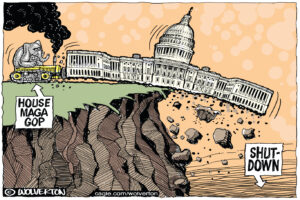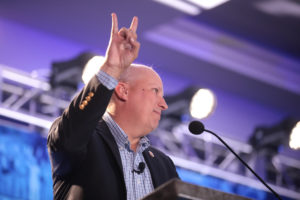Firing Congress
In 225 days, at least one high-ranking politician will become unemployed. How many will join President Bush in retirement?In 225 days, at least one high-ranking politician will become unemployed. How many will join President Bush in retirement?
My hope is that any member of Congress, Republican or Democrat, who stands in the way of approving extended benefits for the growing legion of America’s long-term unemployed will get a pink slip, too.
As soon as it became clear a few months ago that the nation was headed for a steep economic slide — and, possibly, a recession as painful as any we’ve endured since at least the early 1990s — Democrats on Capitol Hill tried to include in a relief package extended benefits for jobless workers who have exhausted their customary 26 weeks of unemployment benefits. The idea was dropped after the White House and congressional Republicans objected, and a consensus emerged to quickly thrust a tax rebate into consumers’ wallets so that spending would stimulate the economy.
The bleak economic news that has bombarded us over the past few days requires a rethinking of that quick fix. Friday’s jobless report, which put the overall unemployment level at 5.5 percent, included other foreboding signs. Much was made — especially at the White House — about an influx of teenagers into the work force. They helped push up the unemployment rate suddenly and sharply. But the jobs report also marked the sixth consecutive month that private employers cut payrolls, and the losses bled through virtually every sector of the economy. Manufacturing, construction, retailing and professional services all cut jobs.
More grim news: Nearly one in five unemployed workers has been looking for a job for more than six months. These are people whose unemployment benefits already have expired, or are about to expire. These are the workers who would be helped if Congress and the White House acknowledge the reality that we are, in fact, in a severe economic slump, even though no official “recession” has been declared.
For its part, the White House continues its wait-and-see strategy on extending unemployment benefits. “We don’t think it’s necessary and appropriate at this point,” says Bush spokesman Tony Fratto. The White House has been circulating a chart that shows that in recent recessions, unemployment has edged up higher — 5.7 percent in the 2002 downturn, for example — before extended benefits were approved.
But there are so many other numbers to consider this time. Like $4-a-gallon gas. And record numbers of home foreclosures. And food prices that are spiraling upward.
Inflation in energy and food costs alone is squeezing millions of American families who are still working. They are scrimping to compensate by forgoing other purchases, a tightfistedness that places the economy in an even tighter vise. Someone who has been out of work for six months is now beyond belt-tightening and well into the danger zone for losing a home to foreclosure.
“People are losing income,” says Chad Stone, chief economist of the liberal-leaning Center on Budget and Policy Priorities. Extending unemployment benefits “puts money into the pockets of people who are going to spend it. … Give it to rich people and they’ll save it.”
The Senate already has included an unemployment-benefit extension in an Iraq war funding bill that Bush has, for a variety of reasons, threatened to veto. The House was pursuing a similar legislative strategy until Friday’s jobs report at last spurred a greater sense of urgency. “America’s workers and families can wait no longer, and neither will the Congress,” House Speaker Nancy Pelosi, D-Calif., said in a statement. She vowed to bring an extension of unemployment benefits to the floor for a vote. But the strategy for getting it passed — and signed by the president — remains unsettled.
To fix this straightforward problem — getting income into the hands of the nearly 1.6 million Americans who have been looking for work for months, and can’t find it — a simple political solution is required. Forget hitching the benefit extension to another measure, even sure-to-pass legislation such as a war funding bill. Let it stand alone so that lawmakers must vote up-or-down with clarity.
Those whose votes show no consideration for unemployed workers who are struggling to pay mortgages, to buy groceries and to fill up their gas tanks will then become prime candidates for the unemployment line themselves.
Marie Cocco’s e-mail address is mariecocco(at)washpost.com.
© 2008, Washington Post Writers Group
Your support matters…Independent journalism is under threat and overshadowed by heavily funded mainstream media.
You can help level the playing field. Become a member.
Your tax-deductible contribution keeps us digging beneath the headlines to give you thought-provoking, investigative reporting and analysis that unearths what's really happening- without compromise.
Give today to support our courageous, independent journalists.






You need to be a supporter to comment.
There are currently no responses to this article.
Be the first to respond.